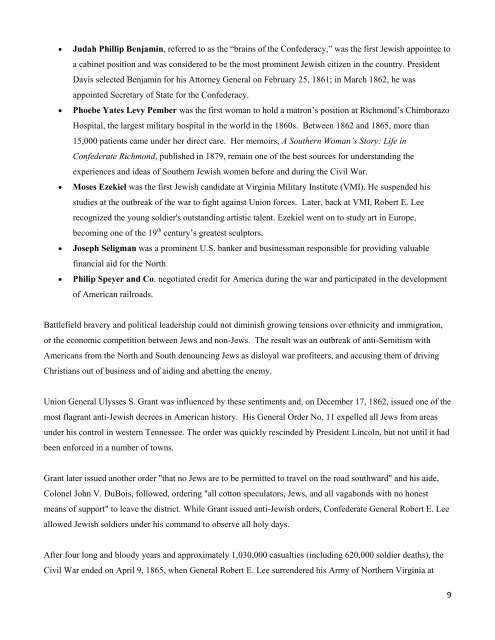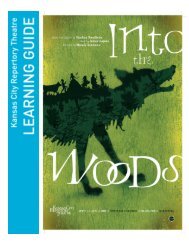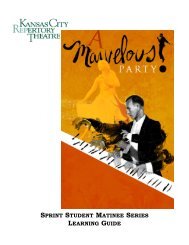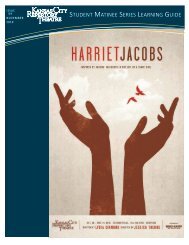Student Matinee Series Learning Guide - The Kansas City Repertory ...
Student Matinee Series Learning Guide - The Kansas City Repertory ...
Student Matinee Series Learning Guide - The Kansas City Repertory ...
Create successful ePaper yourself
Turn your PDF publications into a flip-book with our unique Google optimized e-Paper software.
Judah Phillip Benjamin, referred to as the “brains of the Confederacy,” was the first Jewish appointee to<br />
a cabinet position and was considered to be the most prominent Jewish citizen in the country. President<br />
Davis selected Benjamin for his Attorney General on February 25, 1861; in March 1862, he was<br />
appointed Secretary of State for the Confederacy.<br />
Phoebe Yates Levy Pember was the first woman to hold a matron’s position at Richmond’s Chimborazo<br />
Hospital, the largest military hospital in the world in the 1860s. Between 1862 and 1865, more than<br />
15,000 patients came under her direct care. Her memoirs, A Southern Woman’s Story: Life in<br />
Confederate Richmond, published in 1879, remain one of the best sources for understanding the<br />
experiences and ideas of Southern Jewish women before and during the Civil War.<br />
Moses Ezekiel was the first Jewish candidate at Virginia Military Institute (VMI). He suspended his<br />
studies at the outbreak of the war to fight against Union forces. Later, back at VMI, Robert E. Lee<br />
recognized the young soldier's outstanding artistic talent. Ezekiel went on to study art in Europe,<br />
becoming one of the 19 th century’s greatest sculptors.<br />
Joseph Seligman was a prominent U.S. banker and businessman responsible for providing valuable<br />
financial aid for the North.<br />
Philip Speyer and Co. negotiated credit for America during the war and participated in the development<br />
of American railroads.<br />
Battlefield bravery and political leadership could not diminish growing tensions over ethnicity and immigration,<br />
or the economic competition between Jews and non-Jews. <strong>The</strong> result was an outbreak of anti-Semitism with<br />
Americans from the North and South denouncing Jews as disloyal war profiteers, and accusing them of driving<br />
Christians out of business and of aiding and abetting the enemy.<br />
Union General Ulysses S. Grant was influenced by these sentiments and, on December 17, 1862, issued one of the<br />
most flagrant anti-Jewish decrees in American history. His General Order No. 11 expelled all Jews from areas<br />
under his control in western Tennessee. <strong>The</strong> order was quickly rescinded by President Lincoln, but not until it had<br />
been enforced in a number of towns.<br />
Grant later issued another order "that no Jews are to be permitted to travel on the road southward" and his aide,<br />
Colonel John V. DuBois, followed, ordering "all cotton speculators, Jews, and all vagabonds with no honest<br />
means of support" to leave the district. While Grant issued anti-Jewish orders, Confederate General Robert E. Lee<br />
allowed Jewish soldiers under his command to observe all holy days.<br />
After four long and bloody years and approximately 1,030,000 casualties (including 620,000 soldier deaths), the<br />
Civil War ended on April 9, 1865, when General Robert E. Lee surrendered his Army of Northern Virginia at<br />
9







